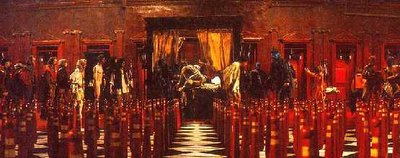 Where I was at the time, The Baby of Mâcon never showed when it was on release. In fact it hardly showed anywhere--in the USA, only New York and Los Angeles. But I read some reviews and didn't get the sense I was missing much.
Where I was at the time, The Baby of Mâcon never showed when it was on release. In fact it hardly showed anywhere--in the USA, only New York and Los Angeles. But I read some reviews and didn't get the sense I was missing much.I've just seen it. And though I saw the film in far from ideal conditions--in my office, on a TV with a PAL video very imperfectly translated to NTSC--it blew me away. It's an extraordinary movie.
The Baby of Mâcon boasts all the pageantry and lavish, colour-coded sets and costumes of, for instance, The Cook, the Thief, His Wife, and Her Lover. Here the setting is the cathedral and the playhouse rather than a restaurant. There is much in the way of pomp and circumstance. Greenaway's point, in part, is to show the performativity of religion, and more generally of power, and also the slippage between performance (staged, "unreal") and performativity (the rituals by which the real is constructed). And then, everything is meticulously choreographed by the director himself.
A child is born, by apparent miracle, and extraordinary power and influence is attributed to it. As well as being the object of more or less innocent adoration, the child also draws the desires of those who would use him to further their own cynical ends. His sister claims to be his mother, insisting that his was a virgin birth. His mother is shut away, along with the tramp-like father. Hovering around the scenes is a naive duke and a sceptical bishop's son, the latter soon to be killed by the putative virgin mother, the former to be the self-declared mother's own downfall, effectively sentencing her to death by gang rape.
It was the gang rape that caused so much controversy at the time of the film's release. But there's nothing voyeuristic about its portrayal, and what's shocking about the scene is what in fact should be shocking: the callousness and the dehumanization in the very idea of thoughtlessly proposing this as "punishment." There is much more that's equally un-nerving here: not least the (literal) carving up of the child immediately after its death, but also (perhaps more insidiously) the fact that even when alive its pronouncements were always only ventriloquized from off-stage. The child himself, so much the centre of attention, is given no lines to speak for himself. He is both fetish and subaltern.

But no description will really do this film justice. It is visually sumptuous, narratively provocative, and overall profoundly disturbing. Go see it if and when you have the chance.
No comments:
Post a Comment